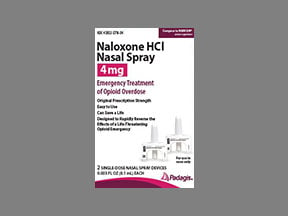
Ft Naloxone Hcl Coupons & Savings Card – Discount Prices from $35.87
Brand for: Naloxone
Naloxone is used for the emergency treatment of known or suspected opioid overdose. Serious opioid overdose symptoms may include unusual sleepiness, unusual difficulty waking up, or breathing problems (ranging from slow/shallow breathing to no breathing). Other symptoms of overdose may include very small pinpoint pupils, slow heartbeat, or low blood pressure. If someone has serious overdose symptoms but you are not sure if the symptoms are due to opioid overdose, give naloxone right away anyway, since lasting slow/shallow breathing may cause permanent damage to the brain or death. Since symptoms of opioid overdose may return after treatment, be sure to get medical help right away after giving the first dose of naloxone. This medication belongs to a class of drugs known as opioid antagonists. It works by blocking the effects of the opioid in the brain.
Our Ft Naloxone Hcl coupons are free to use. You can print the coupon, email it to yourself, or receive the Ft Naloxone Hcl coupon via text message. To get your free discount, show the pharmacist your Ft Naloxone Hcl savings card which has the discounted coupon price. Use our filters below to edit the prescription box to match your needs. The Ft Naloxone Hcl prices will update based on your prescription needs. Above our Ft Naloxone Hcl coupons, you can change the location to see pharmacy prices in other areas. Our prescription discount card will update online with the specific pharmacy costs associated with your edits. Be sure to text, email, or print the Ft Naloxone Hcl savings card code that you need after editing the prescription box and location field. Show the discount card to your pharmacist before paying.
My prescription
Edit
4MG/0.1ML, Naloxone (2 Liquids)
Select pharmacy

CVS
$52.20
COUPON PRICE
Albertsons
$35.87
COUPON PRICE
Walmart
$43.04
COUPON PRICE
Walgreens
$44.14
COUPON PRICEFt Naloxone Hcl savings card
Show this card to your pharmacist
Albertsons
$35.87
BIN
ID
PCN
GRP
011867
LH4D9873A3
HT
LABH001
Powered by
Naloxone is used for the emergency treatment of known or suspected opioid overdose. Serious opioid overdose symptoms may include unusual sleepiness, unusual difficulty waking up, or breathing problems (ranging from slow/shallow breathing to no breathing). Other symptoms of overdose may include very small pinpoint pupils, slow heartbeat, or low blood pressure. If someone has serious overdose symptoms but you are not sure if the symptoms are due to opioid overdose, give naloxone right away anyway, since lasting slow/shallow breathing may cause permanent damage to the brain or death. Since symptoms of opioid overdose may return after treatment, be sure to get medical help right away after giving the first dose of naloxone. This medication belongs to a class of drugs known as opioid antagonists. It works by blocking the effects of the opioid in the brain.
Our Ft Naloxone Hcl coupons are free to use. You can print the coupon, email it to yourself, or receive the Ft Naloxone Hcl coupon via text message. To get your free discount, show the pharmacist your Ft Naloxone Hcl savings card which has the discounted coupon price. Use our filters below to edit the prescription box to match your needs. The Ft Naloxone Hcl prices will update based on your prescription needs. Above our Ft Naloxone Hcl coupons, you can change the location to see pharmacy prices in other areas. Our prescription discount card will update online with the specific pharmacy costs associated with your edits. Be sure to text, email, or print the Ft Naloxone Hcl savings card code that you need after editing the prescription box and location field. Show the discount card to your pharmacist before paying.
Ft Naloxone Hcl FAQs
Using the SaveHealth discount card, what is the price of Ft Naloxone Hcl without insurance?
Using the SaveHealth discount card, the price of Ft Naloxone Hcl without insurance is $35.87.
What is the price of Ft Naloxone Hcl at CVS?
The price of Ft Naloxone Hcl at CVS is $52.20.
What is the price of Ft Naloxone Hcl at Walgreens?
The price of Ft Naloxone Hcl at Walgreens is $44.14.
What is the price of Ft Naloxone Hcl at Walmart?
The price of Ft Naloxone Hcl at Walmart is $43.04.
